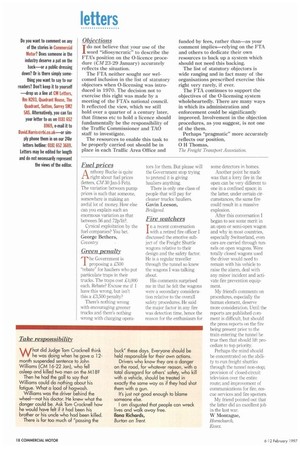Objections
Page 20

If you've noticed an error in this article please click here to report it so we can fix it.
Ido not believe that your use of the word "idiosyncratic" to describe the FTA's position on the 0-licence procedure (CM 23-29January) accurately reflects the situation.
The PTA neither sought nor welcomed inclusion in the list of statutory objectors when 0-licensing was introduced in 1970. The decision not to exercise this right was made by a meeting of the PTA's national council. It reflected the view, which we still hold over a quarter of a century later, that fitness etc to hold a licence should fundamentally be the responsibility of the Traffic Commissioner and TAO staff to investigate.
The resources to enable this task to be properly carried out should be in place in each Traffic Area Office and funded by fees, rather than—as your comment implies—relying on the PTA and others to dedicate their own resources to back up a system which should not need this backing.
The list of statutory objectors is wide ranging and in fact many of the organisations prescribed exercise this right very rarely, if ever.
The FTA continues to support the objectives of the 0-licensing system wholeheartedly. There are many ways in which its administration and enforcement could be significantly improved. Involvement in the objection procedures, as you suggest, is not one of the them.
Perhaps "pragmatic" more accurately reflects our position, 0 H Thomas, The Freight Transport Association,










































































































